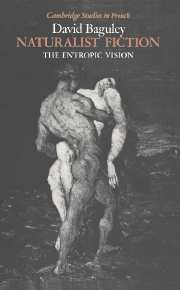Book contents
- Frontmatter
- Contents
- Acknowledgments
- Introduction
- 1 Histories
- 2 Theories: realism, naturalism, genre
- 3 The founding texts
- 4 The tragic model
- 5 Comic strains
- 6 In the ironic modes: naturalist satire and parody
- 7 The ‘scandal’ of naturalism
- 8 Naturalist description
- 9 The entropic vision
- 10 By way of conclusion: two English examples
- Notes
- Translations of passages in French
- Select bibliography
- Index
- Cambridge Studies in French
9 - The entropic vision
Published online by Cambridge University Press: 14 October 2009
- Frontmatter
- Contents
- Acknowledgments
- Introduction
- 1 Histories
- 2 Theories: realism, naturalism, genre
- 3 The founding texts
- 4 The tragic model
- 5 Comic strains
- 6 In the ironic modes: naturalist satire and parody
- 7 The ‘scandal’ of naturalism
- 8 Naturalist description
- 9 The entropic vision
- 10 By way of conclusion: two English examples
- Notes
- Translations of passages in French
- Select bibliography
- Index
- Cambridge Studies in French
Summary
Thematic criticism has now long been out of favour and is often dismissed as an outmoded or unsophisticated, uninventive process of inventorying, as modern theories of literature have apparently evolved at the expense of thematic studies. Formalist critics, poeticians and semioticians, it has been recently argued in an attempt to remedy the situation, ‘ont mis en relief la grammaire et non le message, la langue et non la parole, l'articulation et non le référent’. In practice, though, forms of thematic criticism have been and still are far more extensively applied than is usually considered to be the case. There was, of course, within the French context the prestigious and highly influential spate of psychoanalytical and phenomenological studies in the 1960s, by Roland Barthes, Charles Mauron, Jean-Paul Weber, Jean-Pierre Richard, Georges Poulet, Jean Rousset, Jean Starobinski, which, despite their diversity, are usually grouped together as representing a form of thematic criticism. There is also, among comparatists, the lasting tradition of Stoffgeschichte, studying legendary figures and myths through the ages and across national boundaries, along with the various forms of archetypal criticism which study significant thematic recurrences and relate them to structures of the unconscious, the subconscious, the transhistorical imagination or the ideologies of a particular age. Even deconstruction, though theoretically opposed to the synthesising function of thematic criticism – yet, as Derrida points out in De la Grammatologie, always being prey in a certain way to its own work – can often fall paradoxically, despite itself, as Shlomith Rimmon-Kenan writes, ‘dans le “piége” de la suggestion d'un théme – celui ne serait-il que le thème de l'absence de thème ou celui de l'impossibilité de dégager une signification stable’.
- Type
- Chapter
- Information
- Naturalist FictionThe Entropic Vision, pp. 204 - 223Publisher: Cambridge University PressPrint publication year: 1990

